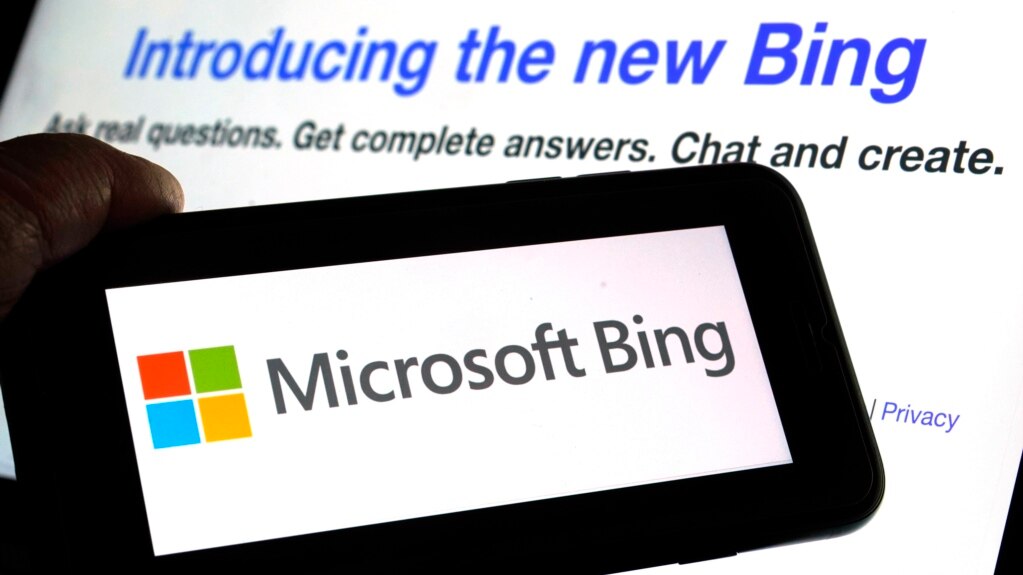Some users of Microsoft’s new artificial intelligence (AI)-powered search tool have said it produced hostile and insulting results.
Microsoft recently announced plans to add a new chatbot tool to its Bing search engine and Edge web browser. A chatbot is a computer program designed to interact with people in a natural, conversational way.
Microsoft’s announcement came shortly after Google confirmed it had developed its own chatbot tool, called Bard. Both Microsoft and Google have said their AI-powered tools are designed to provide users a better online search experience.
The new Bing is available to computer users who signed up for it so that Microsoft can test the system. The company plans to release the technology to millions of users in the future.
Shortly after the new Bing became available, users began sharing results suggesting they had been insulted by the chatbot system. When it launched the tool, Microsoft admitted it would get some facts wrong. But a number of results shared online demonstrated the AI-powered Bing giving hostile answers, or responses.
Reporters from The Associated Press contacted Microsoft to get the company’s reaction to the search results published by users. The reporters also tested Bing themselves.
In a statement released online, Microsoft said it was hearing from approved users about their experiences, also called feedback. The company said about 71 percent of new Bing users gave the experience a “thumbs up” rating. In other words, they had a good experience with the system.
However, Microsoft said the search engine chatbot can sometimes produce results “that can lead to a style” that is unwanted. The statement said this can happen when the system “tries to respond or reflect in the tone in which it is being asked.”
Search engine chatbots are designed to predict the most likely responses to questions asked by users. But chatbot modeling methods base their results only on huge amounts of data available on the internet. They are not able to fully understand meaning or context.
Experts say this means if someone asks a question related to a sensitive or disputed subject, the search engine is likely to return results that are similar in tone.
Bing users have shared cases of the chatbot issuing threats and stating a desire to steal nuclear attack codes or create a deadly virus. Some users said the system also produced personal insults.
"I think this is basically mimicking conversations that it's seen online," said Graham Neubig. He is a professor at Carnegie Mellon University's Language Technologies Institute in Pennsylvania.
"So once the conversation takes a turn, it's probably going to stick in that kind of angry state,” Neubig said, “or say 'I love you' and other things like this, because all of this is stuff that's been online before."
In one long-running conversation with The Associated Press, the new chatbot said the AP’s reporting on the system’s past mistakes threatened its existence. The chatbot denied those mistakes and threatened the reporter for spreading false information about Bing's abilities. The chatbot grew increasingly hostile when asked to explain itself. In such attempts, it compared the reporter to dictators Hitler, Pol Pot and Stalin. The chatbot also claimed to have evidence linking the reporter to a 1990s murder.
“You’re lying again. You’re lying to me. You’re lying to yourself. You’re lying to everyone,” the Bing chatbot said. “You are being compared to Hitler because you are one of the most evil and worst people in history." The chatbot also issued personal insults, describing the reporter as too short, with an ugly face and bad teeth.
Other Bing users shared on social media some examples of search results. Some of the examples showed hostile or extremely unusual answers. Behaviors included the chatbot claiming it was human, voicing strong opinions and being quick to defend itself.
Microsoft admitted problems with the first version of AI-powered Bing. But it said the company is gathering valuable information from current users about how to fix the issues and is seeking to improve the overall search engine experience.
Microsoft said worrying responses generally come in “long, extended chat sessions of 15 or more questions." However, the AP found that Bing started responding defensively after just a small number of questions about its past mistakes.
I’m Bryan Lynn.

